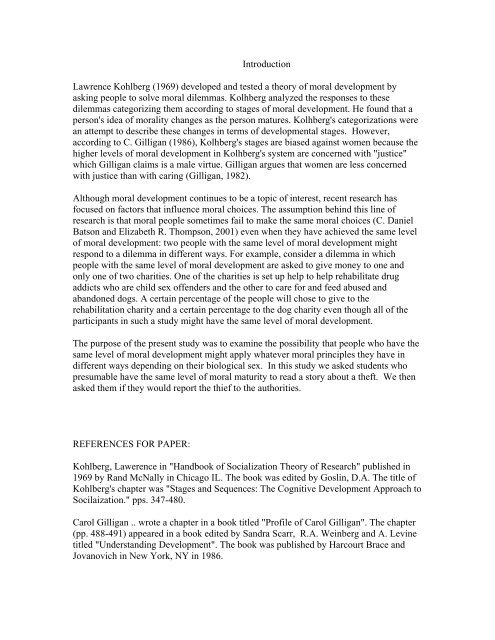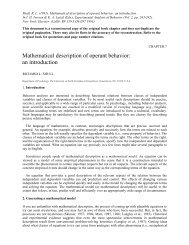Introduction Lawrence Kohlberg (1969) developed and tested a ...
Introduction Lawrence Kohlberg (1969) developed and tested a ...
Introduction Lawrence Kohlberg (1969) developed and tested a ...
You also want an ePaper? Increase the reach of your titles
YUMPU automatically turns print PDFs into web optimized ePapers that Google loves.
<strong>Introduction</strong><br />
<strong>Lawrence</strong> <strong>Kohlberg</strong> (<strong>1969</strong>) <strong>developed</strong> <strong>and</strong> <strong>tested</strong> a theory of moral development by<br />
asking people to solve moral dilemmas. Kolhberg analyzed the responses to these<br />
dilemmas categorizing them according to stages of moral development. He found that a<br />
person's idea of morality changes as the person matures. Kolhberg's categorizations were<br />
an attempt to describe these changes in terms of developmental stages. However,<br />
according to C. Gilligan (1986), Kolhberg's stages are biased against women because the<br />
higher levels of moral development in Kolhberg's system are concerned with "justice"<br />
which Gilligan claims is a male virtue. Gilligan argues that women are less concerned<br />
with justice than with caring (Gilligan, 1982).<br />
Although moral development continues to be a topic of interest, recent research has<br />
focused on factors that influence moral choices. The assumption behind this line of<br />
research is that moral people sometimes fail to make the same moral choices (C. Daniel<br />
Batson <strong>and</strong> Elizabeth R. Thompson, 2001) even when they have achieved the same level<br />
of moral development: two people with the same level of moral development might<br />
respond to a dilemma in different ways. For example, consider a dilemma in which<br />
people with the same level of moral development are asked to give money to one <strong>and</strong><br />
only one of two charities. One of the charities is set up help to help rehabilitate drug<br />
addicts who are child sex offenders <strong>and</strong> the other to care for <strong>and</strong> feed abused <strong>and</strong><br />
ab<strong>and</strong>oned dogs. A certain percentage of the people will chose to give to the<br />
rehabilitation charity <strong>and</strong> a certain percentage to the dog charity even though all of the<br />
participants in such a study might have the same level of moral development.<br />
The purpose of the present study was to examine the possibility that people who have the<br />
same level of moral development might apply whatever moral principles they have in<br />
different ways depending on their biological sex. In this study we asked students who<br />
presumable have the same level of moral maturity to read a story about a theft. We then<br />
asked them if they would report the thief to the authorities.<br />
REFERENCES FOR PAPER:<br />
<strong>Kohlberg</strong>, Lawerence in "H<strong>and</strong>book of Socialization Theory of Research" published in<br />
<strong>1969</strong> by R<strong>and</strong> McNally in Chicago IL. The book was edited by Goslin, D.A. The title of<br />
<strong>Kohlberg</strong>'s chapter was "Stages <strong>and</strong> Sequences: The Cognitive Development Approach to<br />
Socilaization." pps. 347-480.<br />
Carol Gilligan .. wrote a chapter in a book titled "Profile of Carol Gilligan". The chapter<br />
(pp. 488-491) appeared in a book edited by S<strong>and</strong>ra Scarr, R.A. Weinberg <strong>and</strong> A. Levine<br />
titled "Underst<strong>and</strong>ing Development". The book was published by Harcourt Brace <strong>and</strong><br />
Jovanovich in New York, NY in 1986.
Carol Gilligan wrote a book titled "In a Different Voice: Psychological Theory <strong>and</strong><br />
Women's Development" punblished in 1982 by Harvard University Press in Cambridge<br />
MA.<br />
The journal article "Why Don't Moral People Act Morally Motivational Considerations"<br />
was published Current Directions in Psychological Science in 2001, Vol no. 10, pps. 54<br />
to 57. The authors were C. Daniel Batson <strong>and</strong> Elizabeth R. Thompson.





![Graduate Bulletin [PDF] - MFC home page - Appalachian State ...](https://img.yumpu.com/50706615/1/190x245/graduate-bulletin-pdf-mfc-home-page-appalachian-state-.jpg?quality=85)











